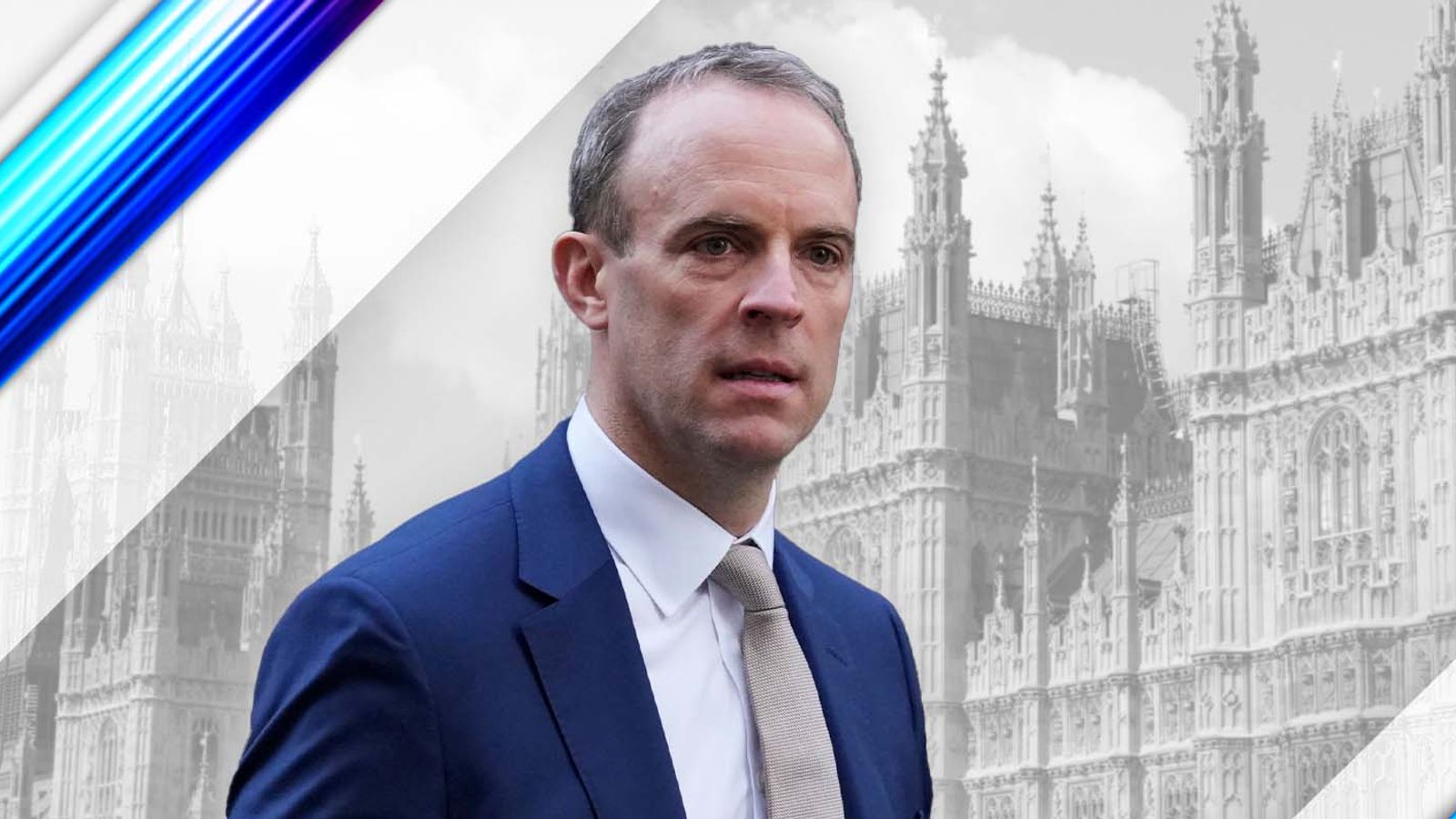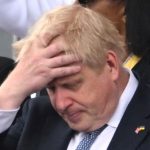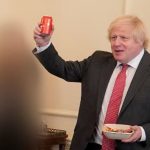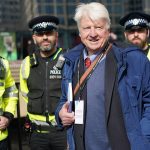For almost three weeks, at the height of a once-in-a-generation crisis, Dominic Raab was in charge of the UK government.
When Boris Johnson was admitted to intensive care with COVID in April 2020, it was Mr Raab who took over at the top.
Addressing the public during a Downing Street news conference shortly after taking over the prime minister’s responsibilities, Mr Raab vowed that he and the rest of the cabinet would “not blink or flinch in the task ahead at this crucial moment”.
Read more:
Dominic Raab resigns
Deputy PM ‘keeps word’ and quits – follow live
“He’s not just the PM – our boss – for all of us in cabinet he is also our colleague, our friend,” Mr Raab said. “If there is one thing I know about this prime minister; he’s a fighter.”
Later that year, he revealed just how serious that moment had been, saying: “I really worried we might lose him.”
It may have marked the most dramatic moment in his time at the top of government, but even without it, the period since he first joined the cabinet in 2018 has not been short of political tumult.
Before politics
An Oxbridge-educated lawyer, Mr Raab also had a career in the legal sector and then as a Foreign Office lawyer during the New Labour years.
This included defending then prime minister Tony Blair in a lawsuit lodged by Slobodan Milosevic, the ex-leader of Yugoslavia.
In 2006, Mr Raab, a karate black belt, moved into politics, working as an aide to then shadow home secretary David Davis.
He also had a spell working for Dominic Grieve, who went on to serve as attorney general during Theresa May’s premiership.
Entrance into parliament
In 2010, Mr Raab stood to be the MP for Esher and Walton after fellow Conservative Ian Taylor stood down.
The seat’s majority surged from just over 7,000 to close to 20,000 as David Cameron came to power in coalition with the Liberal Democrats.
Mr Raab spent his early years in parliament as a backbencher, at one point co-authoring a book on economics called Britannia Unchained: Global Lessons for Growth and Prosperity.
His co-authors on the treatise were Liz Truss, Kwasi Kwarteng, Chris Skidmore and Priti Patel.
In the 2015 election, Mr Raab’s majority in Esher and Walton swelled to close to 30,000.
He was subsequently appointed as a junior minister under Michael Gove, who was then the justice secretary.
Mr Raab’s role included being the minister for human rights.
Support of Brexit and entrance to the cabinet
In 2016, Mr Raab announced he would be supporting the departure of the UK from the European Union.
He was a prominent campaigner working with the Vote Leave organisation.
Mr Raab spoke of his confidence that the UK would strike a trade deal with the EU in the wake of Brexit.
Following the result of the referendum and the resignation of Mr Cameron, Mr Raab stayed on as a government minister in the justice department under Theresa May.
His majority then slipped from close to 30,000 to around 23,000 in the 2017 general election.
In January 2018, Mrs May reshuffled her government and he became a housing minister under Sajid Javid.
It was only a few months later, in July 2018, that Mr Raab joined the top table of government.
When his former boss, David Davis, resigned as Brexit secretary over Mrs May’s Chequers proposal, Mr Raab was tapped as his replacement.
Shortly after taking up the position, Mr Raab was criticised for his comments when he said he “hadn’t quite understood” how reliant UK-EU trade was on the crossing between Dover and Calais.
In November 2018, Mr Raab resigned from the government over his opposition to the Brexit deal which had been agreed with the EU.
But by the following March, amid the nights of endless votes on Brexit, Mr Raab changed tack and voted to support Mrs May’s deal, as he said otherwise there was a “significant risk of losing Brexit altogether”.
Failed leadership run – and actually running the country
After Mrs May stood down as prime minister in 2019, Mr Raab ran to replace her.
While he was never expected to win, his 30 or so supporters gave him negotiating power for a plum job with eventual winner Boris Johnson.
Coming out of the race, he was appointed foreign secretary – one of the great offices of state.
Mr Raab was also given the title of first secretary of state – becoming de facto deputy prime minister.
In the December 2019 election, Mr Raab’s majority collapsed from around 23,000 to under 3,000.
But he kept his position in the cabinet of Mr Johnson’s new majority government.
The first secretary of state role is one that puts a minister above all other secretaries of state, which is the rank of most cabinet ministers.
Held by George Osborne under David Cameron, John Prescott under Tony Blair and Michael Heseltine under John Major, it is a role not always filled and not one often called upon.
But during the COVID pandemic, Mr Raab had to step up to the plate and lead the government when Mr Johnson was admitted to hospital with coronavirus.
After Mr Johnson was diagnosed with the virus at the end of March 2020, it was confirmed Mr Raab would be in charge of the country should the prime minister be unable to discharge his duties.
On 5 April that year, Mr Johnson was admitted to hospital and Mr Raab stood in, chairing meetings, delivering news conferences and responding at Prime Minister’s Questions.
It was only on 27 April 2020 that Mr Johnson once more took over again as prime minister.
Hong Kong, Afghanistan and exiting the Foreign Office
After stepping back from running the country, Mr Raab returned to running the Foreign Office.
He was still dealing with the impacts of the pandemic, and it was soon announced that the international development brief would be added to his portfolio.
In the summer of 2020, Mr Raab announced the UK would offer a route for people from Hong Kong who held British National (Overseas) status to Britain after China effectively took over the region.
He announced in the Commons that China’s actions constituted a “clear and serious breach” of the treaty agreed between China and the UK in 1984 regarding the semi-autonomous city.
More than 144,000 people have since applied for the visa scheme.
The final act of Mr Raab’s tenure as foreign secretary arrived with the withdrawal of Western forces from Afghanistan in August 2021.
The country was plunged into chaos, with a resurgent Taliban capturing swathes of the nation as Joe Biden and US allies pulled out their troops.
Please use Chrome browser for a more accessible video player
Evacuation efforts – known as Operation Pitting – were beset by issues, including people waiting in sewers to get into Kabul airport, and hanging from the side of aeroplanes as they took off in an attempt to flee the Taliban.
It soon emerged that Mr Raab was on holiday in Crete, and he fought off calls to resign following reports he was rejecting phone calls while away.
He later said that with the “benefit of hindsight” he would have returned earlier.
Mr Raab was mocked for telling Sky News that he was not paddleboarding as “the sea was closed”.
By mid-September, Mr Johnson had reshuffled his government and Mr Raab was removed from the Foreign Office. He was made justice secretary and deputy prime minister.
Replacement of Boris Johnson
Amid swathes of Conservative government resignations and calls for Mr Johnson to step down as prime minister in mid-2022, Mr Raab remained in post as justice secretary.
After Mr Johnson announced his resignation, Mr Raab announced his support for Rishi Sunak and was one of his most vocal supporters.
When Liz Truss won the race to be prime minister, Mr Raab left the cabinet and spent the following weeks engaging on social media with constituency issues.
Once the Truss premiership collapsed, Mr Raab returned to government once again as justice secretary and deputy prime minister.
Please use Chrome browser for a more accessible video player
Bullying allegations and downfall
Soon after Mr Sunak entered Downing Street, allegations began to swirl about another one of his allies – Gavin Williamson.
Eventually, Mr Williamson offered his resignation, but the spotlight soon turned to Mr Raab.
In November 2022, Mr Raab requested an investigation into the bullying claims made against him – although he insisted at the time that he was “confident that I have behaved professionally throughout”.
Adam Tolley KC was charged with leading the investigation.
Now Mr Raab has left the government, he is facing the likelihood of losing his seat as an MP at the next general election.
It is a top Liberal Democrat target, and his majority of less than 2,000 is looking precarious with the current unpopularity of the Conservatives.






















